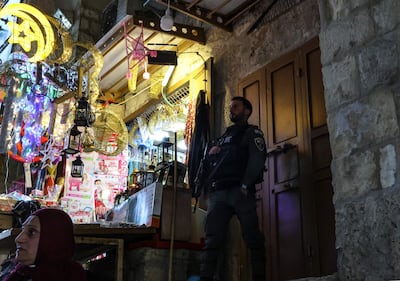Preparations for Ramadan are well under way at Al Aqsa Mosque, in the heart of Jerusalem’s Old City, where Muslims hope the holy month will be free from the turmoil of recent years.
The sunbaked courtyard of Islam’s third-holiest site stands serene above the bustling streets of the Old City.
Worshippers emerge from the shaded alleys on to the compound at Al Aqsa Mosque after passing checkpoints, while tourists are ushered away before prayer time.
“Things are heading towards being normal, meaning that people will come to pray and return home. God willing, nothing will happen,” said Mohammed Al Ashhab, head of public relations at the Waqf, which oversees Jerusalem’s Islamic sites.
The hope for a return to such a daily rhythm follows two troubled Ramadans in the holy city, with the coronavirus pandemic bringing religious life to a standstill in 2020.
Muslims flocked to Al Aqsa last spring, only for the sacred site to be marred by violence between Israeli security forces and worshippers.
More than 1,000 Palestinians were wounded in East Jerusalem during Ramadan, according to medics, as were dozens of Israeli police officers.
Even on nights when the compound itself was peaceful, worshippers regularly faced clashes at the city’s Damascus Gate as they journeyed home.

While people hope such scenes will not be repeated this Ramadan, there is also optimism that worshippers from afar will be able to celebrate the holy month in Jerusalem.
“We welcome everyone, and we are ready for the world to come and worship,” Mr Al Ashhab said.
“To enjoy themselves, to pray and return to the world safe and sound to their families.”
Muslims usually travel to Jerusalem from Turkey and elsewhere during Ramadan, if they are granted entry by Israeli authorities.
Foreign visitors were a rare sight in the city during the past two years because of the pandemic.
But with few coronavirus restrictions now in place at the borders, tourists and pilgrims have returned to Al Aqsa Mosque compound in recent weeks.
They stroll atop the ancient stones in small groups, gazing in awe at the golden Dome of the Rock and posing for photos. The site stands above the Western Wall, the holiest site where Jews can pray.

Ramadan potentially brings greater freedoms for Palestinians from the West Bank, which, along with East Jerusalem, has been occupied by Israel since the 1967 Arab-Israeli war.
Israeli authorities often ease permit rules during the holy month, allowing more West Bank residents to travel to Jerusalem.
As the Ramadan lights are strung up this year, the abandoned streets of 2020 seem a distant memory.
But coronavirus is ever present and staff at Al Aqsa encourage worshippers to wear masks.
“We usually contract a cleaning company, because there are usually a lot [of worshippers],” Mr Al Ashhab said. After Taraweeh prayers at 11pm, the team enters to do a full clean of the plaza, he said.
The crowds will go down into the streets of the Old City, where shopkeepers hard hit by the pandemic will be waiting for customers.
Stalls also pop up during Ramadan, selling gifts and toys of all kinds, while the aromas from food stalls drift through the alleys.
“We hope that things will be calm and nothing will happen in Jerusalem,” said Mr Al Ashhab, looking to the weeks ahead.
“People who have children with them, and the elderly, will be able to arrive at Al Aqsa Mosque, pray and enjoy themselves in peace.”




















